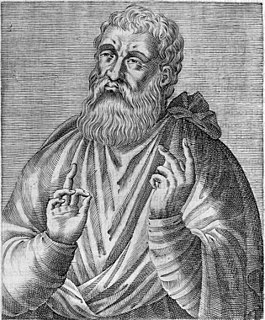A Quote by Gilbert K. Chesterton
Related Quotes
Some say Christianity is just a crutch. But let's turn the question on its edge for a moment. Is atheism an emotional crutch, wishful thinking? The ax cuts both ways. Perhaps atheists are rejecting God because they've had a bad relationship with their father. Instead of inventing God, have atheists invented non-God? Have they invented atheism to escape some of the frightening implications of God's existence? Think about it.
Modern American politicians have the same cowardice about denying an equally bloodthirsty even sillier god, Jehovah.
None of us would seriously consider the possibility that all the gods of Homer really exist... I think that all of us would say in regard to those gods that we were atheists. In regard to the Christian God, I should, I think, take exactly the same line.
The Romans called the Christians atheists. Why? Well, the Christians had a god of sorts, but it wasn't a real god. They didn't believe in the divinity of apotheosized emperors or Olympian gods. They had a peculiar, different kind of god. So it was very easy to call people who believed in a different kind of god atheists. And that general sense that an atheist is anybody who doesn't believe exactly as I do prevails in our own time.
I might say that the debate between atheists and Christians is rather stale to me, because the Christians say, "You must be a Christian, or you must be a religious man, in order to be good," and the atheists will say, "It's beneath the dignity of a free man to bow his knee to a god, as if he were a sinner," or something like that.
When did atheists become so evangelical? I mean, if you don't believe something to be true, wouldn't you just ignore it? That's certainly what I do. Whether it's leprechauns or a congressional debt reduction plan - if I'm convinced it's fiction, I simply put it out of my mind. Not the atheists. They are obsessed with faith and religious practice. Their identities and their works are one big reaction to that which they hate. No longer content to simply dismiss God and those who follow in Him, the New Atheists have created a cult of unbelief.
But they that hold God to be [an incorporeal substance]do absolutely make God to be nothing at all. But how? Were they atheists? No. For though by ignorance of the consequence they said that which was equivalent to atheism, yet in their hearts they thought God a substanceSo that this atheism by consequence is a very easy thing to be fallen into, even by the most godly men of the church.
If some should accuse us as if we held that people born before the time of Christ were not accountable to God for their actions, we shall anticipate and answer such a difficulty. We have been taught that Christ is the first-begotten of God, and we have declared him to be the Logos of which all mankind partakes. Those, therefore, who lived according to reason (logos) were really Christians, even though they were thought to be atheists, such as, among the Greeks, Socrates, Heraclitus and others like them.






































